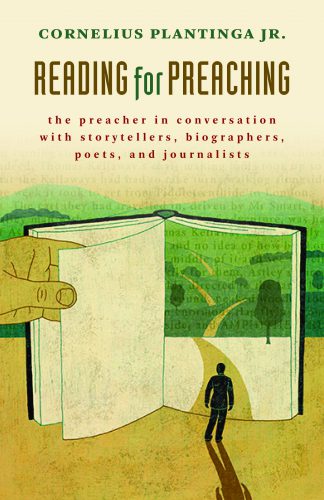
Call it a nerd’s dream-come-true. A few months before I attended their three week summer seminar called “Imaginative Reading for Creative Preaching,” Calvin College mailed me a rather large box filled with all manner of books — novels, poetry, short stories, journalism, biography, and children’s literature. Steinbeck’s Grapes of Wrath was bunking next to Gilead, which was sleeping atop a Robert Frost anthology of poems. I did my best to read as many of the books as I could before my family and I trekked to Grand Rapids for a sabbatical. My fellow seminar participants and I then spent each weekday thumbing through dog-eared pages with host Cornelius (Neal) Plantinga, Jr. and his friends. Each day, with each genre, we asked how a preacher might be enriched by the goodness, truth and beauty captured within these pages. That experience, a dozen years ago, remains a holy memory for me. And on better days, it pushes me to remember that, as Neal made clear: in one sense, as a preacher, you are what you read.
 Much joy from that season returned to me as I read Neal’s 2013 offering, Reading for Preaching: The Preacher in Conversation with Storytellers, Biographers, Poets, and Journalists. The fruit of many such seminars, Neal’s project strikes me as close to the heart of Mockingbird, in that he mines the best of great literature for insights on wisdom, sin, and grace. This is not to say that preachers should strive for “pretty sermons” nor overload listeners with excessive or obtuse literary references. Still, Neal does argue for a program of general reading for preachers, claiming that the “reading preacher will discover that great writers know the road to the human heart and, once at their destination, know how to move our hearts.” Yes, a preacher’s authority “does not derive from the lordship of literature,” nor is there ever a good time to utter the phrase, “Thus saith Philip Roth.” But because great writers “stretch our sympathies,” the “thoughtful preacher gets a little bigger each time she reads.” Whether her language is tuned by poetry, her wisdom broadened by a novel’s profundity, or her worldview clarified by the “noble simplicity” of children’s books, literature can have an ennobling impact on the preacher’s life and sermons.
Much joy from that season returned to me as I read Neal’s 2013 offering, Reading for Preaching: The Preacher in Conversation with Storytellers, Biographers, Poets, and Journalists. The fruit of many such seminars, Neal’s project strikes me as close to the heart of Mockingbird, in that he mines the best of great literature for insights on wisdom, sin, and grace. This is not to say that preachers should strive for “pretty sermons” nor overload listeners with excessive or obtuse literary references. Still, Neal does argue for a program of general reading for preachers, claiming that the “reading preacher will discover that great writers know the road to the human heart and, once at their destination, know how to move our hearts.” Yes, a preacher’s authority “does not derive from the lordship of literature,” nor is there ever a good time to utter the phrase, “Thus saith Philip Roth.” But because great writers “stretch our sympathies,” the “thoughtful preacher gets a little bigger each time she reads.” Whether her language is tuned by poetry, her wisdom broadened by a novel’s profundity, or her worldview clarified by the “noble simplicity” of children’s books, literature can have an ennobling impact on the preacher’s life and sermons.
To Neal Plantinga, and to Mockingbird Ministries, I can only say, “Preach on.” Keep finding Scripture’s deepest truths mirrored and illumined in great literature, art, music, and movies. Keep calling Christians to open our eyes to treasures hidden in plain sight at local libraries and bookstores. Keep demonstrating how law and grace are elegantly translated in our best short stories and poems. Keep reminding us, as Neal does via John Calvin, that “the Holy Spirit sows truth promiscuously, and the searching preacher is likely to find it in some unlikely places.”

COMMENTS
Leave a Reply












